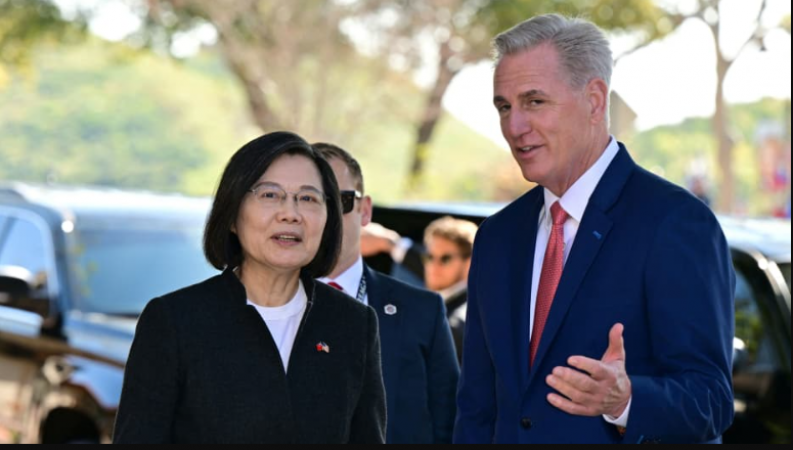
Taipei: China promised a "resolute response" after Taiwan's president met US House Speaker Kevin McCarthy on Thursday and sent warships through the waters near Taiwan.
The leader of Taiwan, Tsai Ing-wen, met with McCarthy on Wednesday in Los Angeles and expressed gratitude for the encounter, which she said demonstrated that her island was not alone in the world.
Hours before the talks began, China had repeatedly warned both parties against attending the meeting and had sent an aircraft carrier through the waters close to Taiwan. According to Taiwan's Ministry of National Defense on Thursday morning, three more warships have been spotted in the waters separating the island from the mainland Chinese mainland.
Also Read: Helsinki's decision to join NATO will "negatively" impact its relations with Russia
According to the ministry, an anti-submarine helicopter also passed through the island's air defence identification zone. China views Taiwan as a part of its territory despite the fact that it has been governed separately for more than 70 years and has vowed to one day annex it, using force if necessary.
Following Nancy Pelosi, McCarthy's predecessor, who visited Taiwan in August of last year, China conducted its largest-ever air and sea exercises in the vicinity of the island.
In August, China sent warships, missiles, and fighter aircraft to the skies and waters surrounding Taiwan. It has so far responded to the McCarthy meeting on a much lower level. Tsai claimed that politicians on both sides of the political spectrum in the US had welcomed her with open arms.
Also Read: US starting to plan 'countermeasures' against North Korea with allies in Asia
In a press conference at the Ronald Reagan Presidential Library in Simi Valley, she said, "Their presence and unwavering support reassure the people of Taiwan that we are not isolated and we are not alone." Actually, Tsai's trip to California was just a stopover on the way to visit two of Taiwan's dwindling number of official diplomatic allies in Latin America.
After the Tsai-McCarthy meeting, China scolded harshly.
Chinese foreign ministry: "China will take resolute and effective measures to safeguard national sovereignty and territorial integrity in response to the seriously mistaken acts of collusion between the United States and Taiwan."
However, there were no early indications of increased military activity on Pingtan island in southeast China, which is home to a People's Liberation Army base and is regarded as the location closest to Taiwan on the Chinese mainland.
Following Pelosi's visit, AFP journalists on Pingtan last year saw missile launches and army helicopters flying over the island.
McCarthy, who is second in line for the US presidency, stated that the relationship between the two countries was "a matter of profound importance to the free world" and was supported by a shared belief in freedom and democracy.
He had initially intended to travel alone, but decided to meet Tsai in California instead. The choice was seen as a compromise that would demonstrate support for Taiwan while preventing escalation of hostilities with China.
McCarthy vowed that US arms sales to Taiwan, which anger the Chinese leadership, would go on as part of a tried-and-true deterrence tactic.
He continued, "And what we know from history is that the best way to do that is to provide the weapons that enable people to deter war. The Ukraine experience taught us an important lesson: imposing sanctions alone won't deter future aggressors from going to war.
Even though Taiwan has all the hallmarks of a fully functional state, only a small number of nations recognise it as a sovereign state. In accordance with a carefully crafted diplomatic ruse, the United States formally recognises authoritarian Beijing while also supporting Taiwan and maintaining close commercial and unofficial ties.
To China's chagrin, Taipei is supported by both political parties in the US Congress and has become closer to Washington under Tsai's leadership. More than a dozen lawmakers, both Democrats and Republicans, attended the meeting in California, which Pelosi praised on Wednesday.
For its leadership, bipartisan participation, and distinguished and historic setting, today's meeting between Taiwan's President Tsai and Speaker McCarthy merits praise, she said. Tsai's term as president of Taiwan expires in 2024, and her party is up against challengers who are seen as being closer to Beijing.
Even as China seizes allies and exerts pressure on other governments to isolate Taipei, she has positioned herself as a defender of the status quo — de facto but unspoken independence.
The urgency of preserving the light of freedom cannot be overstated, she told reporters, as "democracy is once again under threat in the world.
"As we meet the particular challenges of our time, Taiwan is grateful to have the United States of America by our side on all sides."